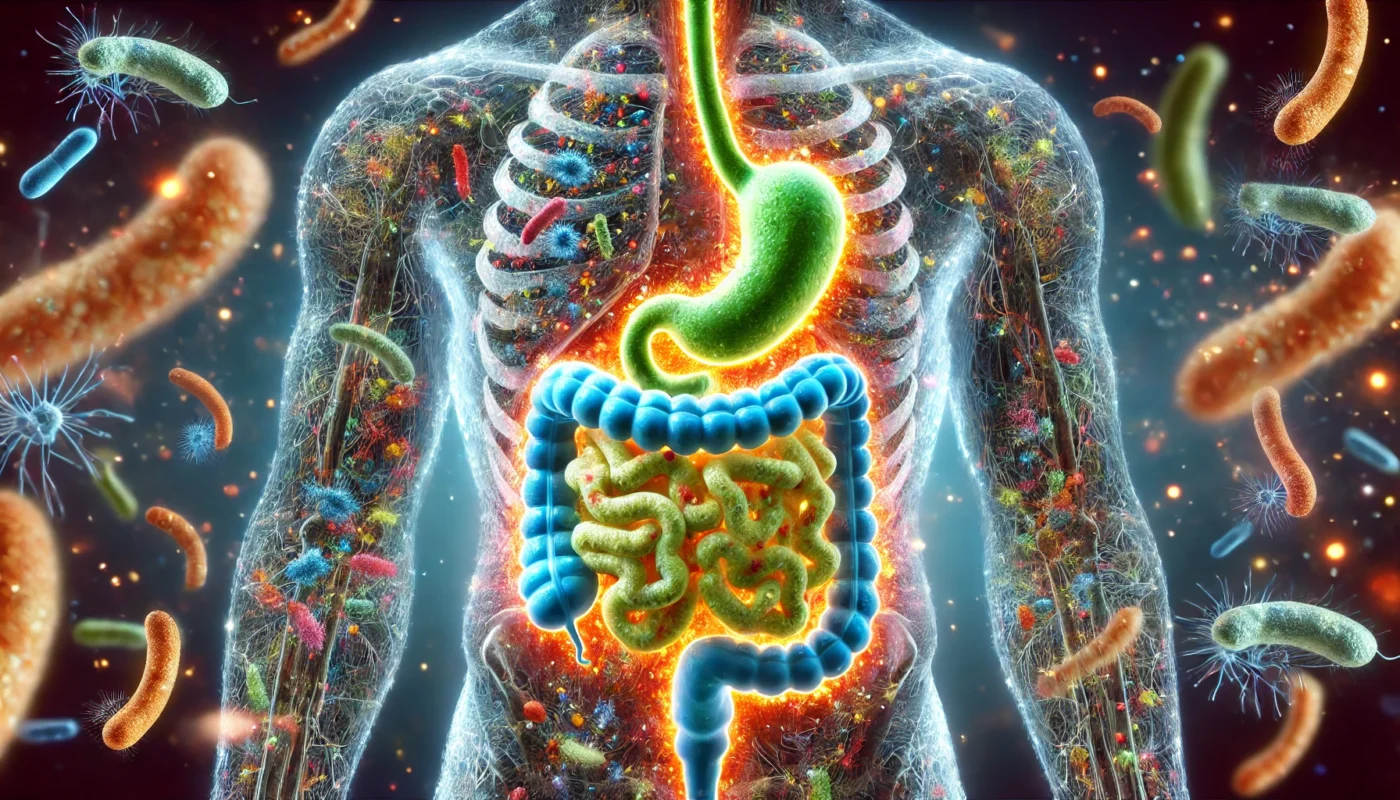The term “gut health” encompasses the balance of microorganisms living in your digestive tract. Maintaining the right balance of these microorganisms is crucial for your physical and mental well-being. An unhealthy gut can contribute to a wide range of issues including inflammation, fatigue, anxiety, and digestive disorders.
The Role of the Gut Microbiome
The gut microbiome consists of trillions of bacteria, viruses, and fungi. These microorganisms are involved in various bodily functions, including digestion, nutrient absorption, and immune system regulation. A healthy gut microbiome is diverse and balanced, promoting optimal digestive health and supporting the body’s defense mechanisms.
Diversity in the gut microbiome is essential. Different strains of bacteria perform different functions, and a lack of diversity can lead to the dominance of harmful bacteria. This imbalance can trigger inflammatory responses that affect the entire body. Introducing a range of microorganisms through diet and lifestyle can support a balanced microbiome.
Importance of Gut Health for Immune Function
The gut is home to a significant portion of the body’s immune system. The gut-associated lymphoid tissue (GALT) is a major component of the body’s immune defense. It monitors and responds to pathogens entering the body through the digestive tract. A healthy gut supports a robust immune response, reducing the risk of infections and autoimmune disorders.
Gut health is also linked to the production of antibodies. The microbiome interacts with immune cells to stimulate the production of Immunoglobulin A (IgA), which plays a critical role in mucosal immunity. An imbalanced gut can lead to decreased IgA levels, compromising the body’s ability to fend off infections.
Gut Health and Mental Well-being
The gut-brain axis is a complex communication network that links the central nervous system and the enteric nervous system, which governs the function of the GI tract. Neurotransmitters like serotonin, a significant portion of which is produced in the gut, play a vital role in mood regulation. An unhealthy gut can disrupt serotonin production, leading to mood disorders.
Stress and anxiety can exacerbate gut issues. The vagus nerve, which connects the brain to the gut, can trigger digestive discomfort during periods of stress. This bidirectional communication means that improving gut health can have a positive impact on mental health, and vice versa.
You May Also Like: Managing Pain Through Dietary Choices

How to Heal Your Gut Naturally
Dietary Adjustments for Gut Health
Your diet plays a crucial role in shaping your gut microbiome. Choosing foods that promote the growth of beneficial bacteria can improve gut health and overall well-being. Avoiding foods that disrupt the microbiome is equally important.
Embrace Prebiotics and Probiotics
Prebiotics and probiotics are essential for maintaining a healthy gut microbiome. Prebiotics are non-digestible fibers that feed beneficial bacteria, while probiotics are live beneficial bacteria. Incorporating foods rich in these elements can significantly enhance gut health.
- Probiotic-rich foods: Yogurt, kefir, sauerkraut, kimchi, and kombucha.
- Prebiotic-rich foods: Garlic, onions, bananas, asparagus, and oats.
Adding a variety of these foods to your diet can lead to a more diverse microbiome. Different strains of bacteria thrive on different prebiotics, so a varied intake is beneficial. Consuming fermented foods regularly can introduce new bacterial strains to your gut, promoting diversity and balance.
Focus on Fiber
Dietary fiber is crucial for digestive health. It not only keeps your digestive system functioning smoothly but also serves as nourishment for the beneficial bacteria in your gut. Aim to include a variety of high-fiber foods such as fruits, vegetables, legumes, and whole grains in your diet.
Soluble fiber, found in foods like oats and beans, absorbs water and forms a gel-like substance during digestion. This can help regulate blood sugar levels and lower cholesterol. Insoluble fiber, found in whole grains and vegetables, adds bulk to stool and aids in regular bowel movements, preventing constipation.
Healing the Intestinal Lining
The integrity of the intestinal lining is critical for preventing conditions like leaky gut syndrome, where particles pass through the gut lining into the bloodstream, triggering inflammation. Strengthening the gut lining is an essential step in healing the GI tract.
Bone Broth and Gelatin
Bone broth is rich in collagen and amino acids like glutamine, which can help repair and maintain the integrity of the gut lining. Consuming bone broth or gelatin regularly can support the healing of the intestinal walls.
Collagen supports the structure of the gut lining, while glutamine is a key nutrient for intestinal cells. Regular consumption of bone broth can also provide other essential nutrients like magnesium and calcium, which aid in overall digestive health.
Omega-3 Fatty Acids
Omega-3 fatty acids possess anti-inflammatory properties that can aid in reducing gut inflammation and promoting healing. Incorporate sources such as fatty fish (salmon, mackerel), flaxseeds, and walnuts into your diet.
These healthy fats help modulate inflammatory pathways in the body, reducing the risk of chronic inflammatory diseases. Omega-3s also support the production of short-chain fatty acids in the gut, which are vital for maintaining the health of the gut lining.
Lifestyle Modifications for Gut Health
Beyond diet, lifestyle changes can significantly impact gut health. Stress management, sleep, and physical activity play a key role in maintaining a healthy digestive system.
Manage Stress
Chronic stress can negatively impact gut health by altering gut bacteria and increasing intestinal permeability. Incorporate stress-reduction techniques such as yoga, meditation, or deep-breathing exercises into your daily routine to support gut health.
Regular physical activity not only reduces stress but also promotes the release of endorphins, which can improve mood and digestive function. Mindfulness practices can enhance the gut-brain connection, reducing symptoms of stress-related digestive issues.
Get Adequate Sleep
Sleep is essential for the body’s repair processes, including those that occur in the gut. Aim for 7-9 hours of quality sleep each night to support overall health and well-being.
Establishing a regular sleep schedule can improve circadian rhythms, which are linked to the regulation of gut bacteria. Good sleep hygiene, such as limiting screen time before bed and creating a restful environment, can enhance sleep quality and support digestive health.
Regular Physical Activity
Exercise is a powerful modulator of gut health. Regular physical activity can boost the diversity of gut bacteria and improve digestive function. Aim for at least 30 minutes of moderate exercise most days of the week.
Physical activity increases gut motility, reducing the risk of constipation and promoting regular bowel movements. It also stimulates the production of butyrate, a short-chain fatty acid that supports gut health and reduces inflammation.

Supplements to Support Gut Health
While dietary and lifestyle changes form the foundation of gut health, certain supplements can provide additional support. However, consult a healthcare professional before starting any new supplement regimen.
Digestive Enzymes
Digestive enzymes can aid in the breakdown of food, making it easier for your body to absorb nutrients. They can be particularly beneficial for individuals with digestive disorders or enzyme deficiencies.
Enzymes like amylase, protease, and lipase help break down carbohydrates, proteins, and fats, respectively. Supplementing with digestive enzymes can reduce symptoms of indigestion and bloating, improving overall nutrient absorption.
L-glutamine
L-glutamine is an amino acid that plays a critical role in maintaining the integrity of the intestinal lining. Supplementing with L-glutamine can support gut healing, especially in individuals with increased intestinal permeability.
This amino acid is a primary fuel source for enterocytes, the cells lining the gut. By supporting these cells, L-glutamine can help reduce symptoms of leaky gut syndrome and enhance nutrient absorption.
Probiotic Supplements
While dietary sources of probiotics are essential, probiotic supplements can offer a concentrated dose of beneficial bacteria. Look for a multi-strain probiotic with a high CFU count for optimal benefits.
Probiotic supplements can help restore balance to the gut microbiome, especially after antibiotic use or during periods of high stress. They can also support immune function and reduce the risk of infections.
The Connection Between Gut Health and Overall Well-being
The health of your GI tract is intrinsically linked to your overall well-being. A balanced gut microbiome supports not only digestive health but also mental health, immune function, and even skin health. By focusing on natural remedies and lifestyle changes, you can pave the way for a healthier gut and a healthier you.
The Gut-Brain Axis
The gut-brain axis is a bidirectional communication pathway between the gut and the brain. An imbalance in gut bacteria can influence mood and cognitive function, highlighting the importance of maintaining gut health for mental well-being.
Maintaining a healthy gut can improve neurotransmitter production, positively affecting mood and reducing the risk of depression and anxiety. The microbiome also plays a role in the production of brain-derived neurotrophic factor (BDNF), which supports cognitive function and memory.
Immune System Support
A healthy gut microbiome is crucial for a robust immune system. Beneficial bacteria help regulate immune responses, preventing excessive inflammation that can lead to autoimmune diseases.
Gut bacteria also support the development and function of T-cells, which are essential for immune defense. A balanced microbiome can enhance the body’s ability to fight off infections and reduce the risk of chronic diseases.
Skin Health and the Gut
The state of your gut can significantly impact skin health. Conditions like acne, eczema, and psoriasis have been linked to gut dysbiosis, an imbalance in the gut microbiome.
Healing the gut can lead to improvements in skin conditions by reducing inflammation and restoring balance to the microbiome. Probiotics and prebiotics can support skin health by promoting a healthy gut-skin axis.
Practical Steps to Boost Gut Health
- Incorporate Fermented Foods: Adding a variety of fermented foods to your diet can introduce beneficial bacteria to your gut.
- Stay Hydrated: Drinking sufficient water supports digestion and nutrient absorption.
- Limit Processed Foods: Processed foods can disrupt gut bacteria balance. Focus on whole, unprocessed foods.
- Exercise Regularly: Physical activity promotes gut motility and the growth of beneficial gut bacteria.
Embrace Mindful Eating
Mindful eating involves paying attention to the experience of eating, including the taste, texture, and aroma of food. This practice can improve digestion and nutrient absorption by promoting relaxation and reducing stress.
Eating slowly and chewing food thoroughly can enhance digestive processes, allowing the body to absorb more nutrients. Mindful eating also supports portion control, reducing the risk of overeating and digestive discomfort.
Avoid Antibiotic Overuse
Antibiotics can disrupt the balance of gut bacteria, leading to dysbiosis. Avoid unnecessary use of antibiotics and discuss alternative treatment options with your healthcare provider when possible.
When antibiotics are necessary, consider taking probiotic supplements to restore balance to the microbiome. Supporting gut health during and after antibiotic treatment can reduce the risk of antibiotic-associated diarrhea and other complications.

Conclusion
Healing the GI tract naturally involves a holistic approach that combines dietary adjustments, lifestyle changes, and, where necessary, targeted supplementation. By taking proactive steps to improve gut health, you can enhance your overall health and well-being, reaping benefits that extend far beyond the digestive system. Remember, the journey to optimal gut health is a marathon, not a sprint, and small, consistent changes can lead to significant improvements over time.
Further Reading:
How to Heal Your Gut Naturally: A Clinician’s Guide
l-glutamine, gut health, probiotics, gut microbiome, leaky gut syndrome, immune system, skin health, gut-brain axis, digestive health, holistic health, dietary supplements, fermented foods, mindful eating, antibiotic use, nutrient absorption
Important Note: The information contained in this article is for general informational purposes only, and should not be construed as health or medical advice, nor is it intended to diagnose, prevent, treat, or cure any disease or health condition. Before embarking on any diet, fitness regimen, or program of nutritional supplementation, it is advisable to consult your healthcare professional in order to determine its safety and probable efficacy in terms of your individual state of health.
Regarding Nutritional Supplements Or Other Non-Prescription Health Products: If any nutritional supplements or other non-prescription health products are mentioned in the foregoing article, any claims or statements made about them have not been evaluated by the U.S. Food and Drug Administration, and such nutritional supplements or other health products are not intended to diagnose, treat, cure, or prevent any disease.

